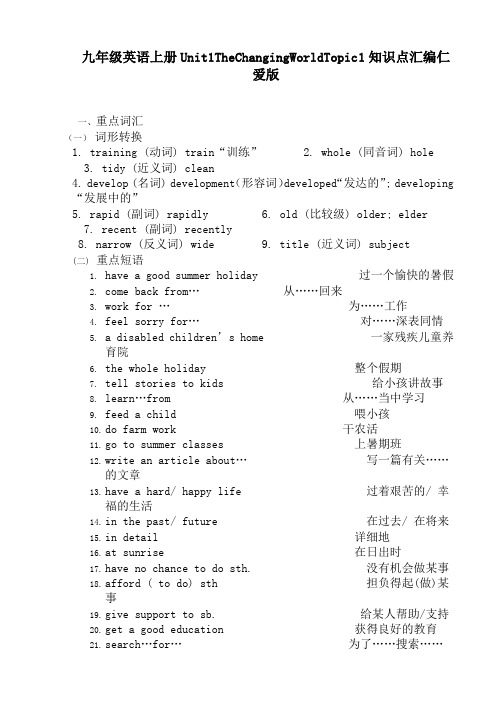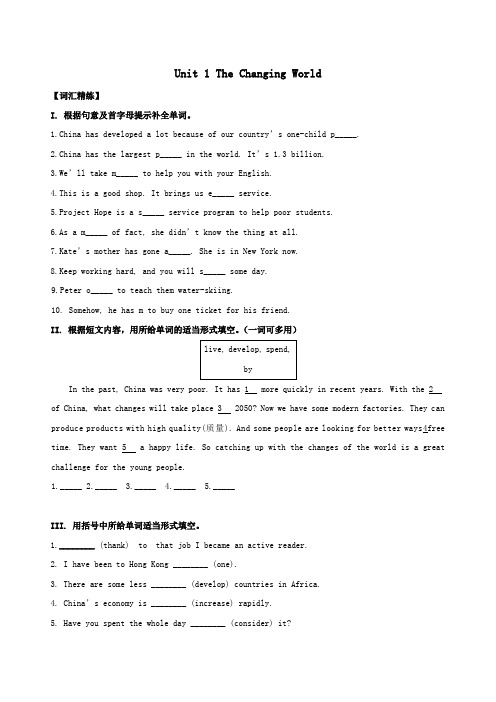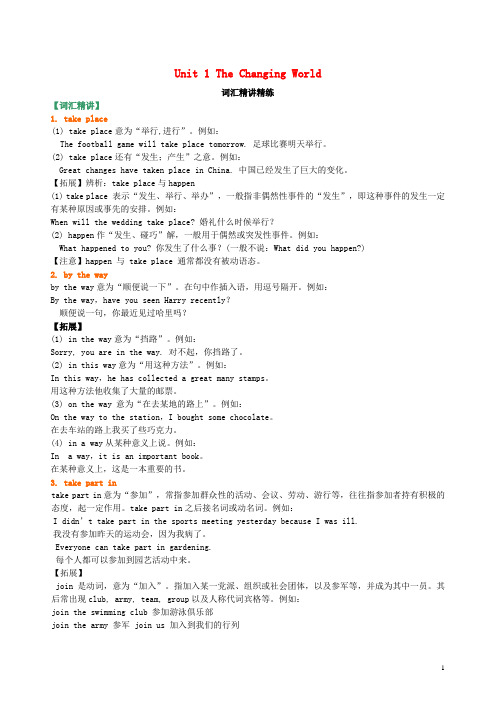九年级英语上册Unit1TheChangingWorld词汇精讲精练新版仁爱版
- 格式:doc
- 大小:46.50 KB
- 文档页数:8

九年级英语上册Unit1TheChangingWorldTopic1知识点汇编仁爱版一、重点词汇(一)词形转换1. training (动词) train“训练”2. whole (同音词) hole3. tidy (近义词) clean4. develop (名词) development(形容词)developed“发达的”; developing “发展中的”5. rapid (副词) rapidly6. old (比较级) older; elder7. recent (副词) recently8. narrow (反义词) wide 9. title (近义词) subject(二)重点短语1.have a good summer holiday 过一个愉快的暑假e back from…从……回来3.work for …为……工作4.feel sorry for…对……深表同情5. a disabled children’s home 一家残疾儿童养育院6.the whole holiday 整个假期7.tell stories to kids 给小孩讲故事8.learn…from 从……当中学习9.feed a child 喂小孩10.do farm work 干农活11.go to summer classes 上暑期班12.write an article about…写一篇有关……的文章13.have a hard/ happy life 过着艰苦的/ 幸福的生活14.in the past/ future 在过去/ 在将来15.in detail 详细地16.at sunrise 在日出时17.have no chance to do sth. 没有机会做某事18.afford ( to do) sth 担负得起(做)某事19.give support to sb. 给某人帮助/支持20.get a good education 获得良好的教育21.search…for…为了……搜索……22.have little food to eat 吃不饱23.dress warmly 穿得暖24.with the development of…随着……的发展25.have a balanced diet 饮食均衡26.play musical instruments 演奏乐器27.sleep in the open air 在户外睡觉28.study/ go abroad 在国外学习/ 出国29.enter/ win/ lose a competition 参加/ 赢得/ 输掉比赛30.enjoy Beijing Opera 欣赏京剧ed to do sth. 过去常做某事32.at sunrise 在日出时33.go hungry 变饿了34.fall ill 得病/ 患病35.divide …into…把……分成……36.feel satisfied with…对……感到满足37.see …. oneself 亲眼看见……38.make progress 取得进步39.thanks to 多亏; 幸亏;由于40.stand for 代表41.with the help of…在……的帮助下42.draw up an outline 拟定提纲三、重点句型1.You have just come back from your hometown. 你刚刚从你的家乡返回。

Unit 1 The Changing WorldTopic 3 The world has changed for the better Ⅰ. 重点短语(词组)注:带“*”为拓展。
Ⅱ.单词解析flood:⑴名词:洪水。
e.g. The rain has caused floods in many parts of the country.⑵动词:(被)淹没。
e.g. The river flooded the field. Ⅲ. 重点句子(型)1. have/has been in + for + 一段时间/since + 时间点(从句);have/has been to + 次数2. How do you like (doing) sth. ? = What do you think of (doing) sth. ?你认为做……怎么样?3. Y ou have been in New Y ork for a long time. 你在纽约有很长时间了。
4. Y ou will get used to it very soon if you come. 如果你来(这里),你将会很快习惯的。
5. The city has improved a lot since I came here a few years ago. 自从我几年来到这,这座城市就已经改善了不少。
6. As a matter of fact,it's a wonderful place to live. 事实上,这是个居住的好地方。
7. Y ou can go to plays,concerts and operas every day if you like. 如果你喜欢,你可以去看表演,去听音乐会或去听歌8. Y ou must come for a visit. 你一定要来参观。
9. Then you can see New Work (for) yourself. 然后你可以亲自看一看纽约。

Unit 1 The Changing World【词汇精练】I. 根据句意及首字母提示补全单词。
1.China has developed a lot because of our country’s one-child p_____.2.China has the largest p_____ in the world. It’s 1.3 billion.3.We’ll take m_____ to help you with your English.4.This is a good shop. It brings us e_____ service.5.Project Hope is a s_____ service program to help poor students.6.As a m_____ of fact, she didn’t know the thing at all.7.Kate’s mother has gone a_____. She is in New York now.8.Keep working hard, and you will s_____ some day.9.Peter o_____ to teach them water-skiing.10. Somehow, he has m to buy one ticket for his friend.II. 根据短文内容,用所给单词的适当形式填空。
(一词可多用)In the past, China was very poor. It has 1 more quickly in recent years. With the 2 of China, what changes will take place 3 2050? Now we have some modern factories. They can produce products with high quality(质量). And some people are looking for better ways4free time. They want 5 a happy life. So catching up with the changes of the world is a great challenge for the young people.1._____2._____3._____4._____5._____III. 用括号中所给单词适当形式填空。

Unit 1 The Changing World词汇精讲精练【词汇精讲】1. take place(1) take place意为“举行,进行”。
例如:The football game will take place tomorrow. 足球比赛明天举行。
(2) take place还有“发生;产生”之意。
例如:Great changes have taken place in China. 中国已经发生了巨大的变化。
【拓展】辨析:take place与happen(1) take place 表示“发生、举行、举办”,一般指非偶然性事件的“发生”,即这种事件的发生一定有某种原因或事先的安排。
例如:When will the wedding take place? 婚礼什么时候举行?(2) happen作“发生、碰巧”解,一般用于偶然或突发性事件。
例如:What happened to you? 你发生了什么事?(一般不说:What did you happen?)【注意】happen 与 take place 通常都没有被动语态。
2. by the wayby the way意为“顺便说一下”。
在句中作插入语,用逗号隔开。
例如:By the way,have you seen Harry recently?顺便说一句,你最近见过哈里吗?【拓展】(1) in the way意为“挡路”。
例如:Sorry, you are in the way. 对不起,你挡路了。
(2) in this way意为“用这种方法”。
例如:In this way,he has collected a great many stamps。
用这种方法他收集了大量的邮票。
(3) on the way 意为“在去某地的路上”。
例如:On the way to the station,I bought some chocolate。


超级资源(共18套70页)仁爱版九年级英语上册(全册)课时练习汇总(可做课后作业)Unit 1 The Changing World词汇精讲精练【词汇精讲】1. take place(1) take place意为“举行,进行”。
例如:The football game will take place tomorrow. 足球比赛明天举行。
(2) take place还有“发生;产生”之意。
例如:Great changes have taken place in China. 中国已经发生了巨大的变化。
【拓展】辨析:take place与happen(1) take place 表示“发生、举行、举办”, 一般指非偶然性事件的“发生”, 即这种事件的发生一定有某种原因或事先的安排。
例如:When will the wedding take place? 婚礼什么时候举行?(2) happen作“发生、碰巧”解, 一般用于偶然或突发性事件。
例如:What happened to you? 你发生了什么事?(一般不说:What did you happen?)【注意】happen 与 take place 通常都没有被动语态。
2. by the wayby the way意为“顺便说一下”。
在句中作插入语, 用逗号隔开。
例如:By the way, have you seen Harry recently?顺便说一句, 你最近见过哈里吗?【拓展】(1) in the way意为“挡路”。
例如:Sorry, you are in the way. 对不起, 你挡路了。
(2) in this way意为“用这种方法”。
例如:In this way, he has collected a great many stamps。
用这种方法他收集了大量的邮票。
(3) on the way 意为“在去某地的路上”。
2019-2020学年仁爱英语九年级上学期单词,词组,句子背默Unit 1 topic 1e back from 从……回来2.see ... oneself 亲眼目睹……3.take place 发生4.in the 1960s 在20世纪60年代5.find a proper place 找一个合适的地方6.living conditions 生活条件7.take photos 照相8.ring roads 环形路9.improve one’s English 提高某人的英语10.enjoy leisure activities 享受娱乐活动11.take part in 参加12.keep in touch with sb. 与……保持联系13.volunteer activities 志愿者活动14.far away 远离15.disabled children’s home 残疾儿童之家16.all / many sorts of ... 所有/许多种类17.learn a lot from ... 从……学到很多18.not only ... but also ... 不仅……而且……19.have no time to do sth. 没时间做某事20.modern schools 现代化的学校21.write an article about ... 写一篇关于……的文22.what’s more 更有甚者23.have / live a hard life 过着艰苦的生活24.made rapid progress 取得快速的进步25.describe sth. in detail 详细地描述某物26.succeed in doing sth. 成功做某事27.afford an education for .. 供得起……的教育28.dream about 梦想29.spend one’s childhood 度过某人的童年30.in the open air 在户外31.in order to do sth. 为了做某事32.go to the movie theater 去电影院33.support one’s family 供养家庭34.take exercise 体育锻炼35.child laborers 童工36.go roller skating 滑旱冰37.day and night 日日夜夜38.with the help of sb. 在某人的帮助下39.develop rapidly 发展迅速40.consider doing sth. 考虑做某事41.give support to sb. 给某人支持42.with the development of .. 随着……的发展43.write a composition 写一篇作文44.get/receive a good education 获得好的教育45.check over 检查46.have a/no chance to do sth. 有/没有机会做某事47.thanks to the government’s efforts 多亏政府的努力48.more than 多于三、1. Great change s have taken place there and my hometown has become more and more beautiful.那儿变化很大,而且我的家乡变得越来越美丽了。
Unit 1 The Changing World句式精讲精练【句式精讲】1.What about you?What about…?=How about …?意为“……怎么样?”,是一个用来提建议或者征求别人意见的句式,有时也可以用来询问某人的身体状况或者近况。
其中的about是介词,因此后面要跟名词,代词或者动名词来做宾语。
例如:How (What) about the fruit? 那水果呢?How (What) about going swimming? 去游泳怎么样?How (What) about your holiday? 你的假期怎么样?How (What) about your mother? 你妈妈怎么样?2. I have been to Mount Huang with my parents.(1) been是be动词的过去分词形式。
(2) have been to是现在完成时形式,一般与already, ever, never连用。
例如:He has never been to Paris.他从未去过巴黎。
【拓展】have been to; have been in 与have gone to的辨析:(1)“have/ has been to + 地点”表示“去过某地”,现在已经回来了。
例如:I’ve been to Beijing twice. 我已去过北京两次。
(2)“have/has been in + 地点”表示“在某地待了一段时间”。
例如:He’s been in this school for two years.他在这所学校待了两年了。
(3)“have/has gone to + 地点”表示“到某地去了”,现在还没有回来,可能在去的途中,也可能在那里或返回的途中。
例如:—Where’s Wei Hua? 魏华在哪里?— She has gone to the zoo. 她到动物园去了。
仁爱九年级上册Unit1: The changing worldTopic1 知识点一、重点短语和表达take place发生 so…that…如此…以至于… come back from…从…返回learn…from…从…学习… take part in参加 put on上演,穿上a group of一组,一群 keep in touch with sb和某人保持联系 far away远离reform and opening-up改革开放 medical care医疗服务 what’s more而且,更重要的是make progress取得进步 dream about梦想 play a part in…在…起作用/扮演角色in one’s spare time在某人的空闲时间 go abroad出国 in the past在过去二、重点句型be happy to do sth高兴做某事have (no) time to do sth (没)有时间做某事have (no) chance to do sth (没)有机会做某事三、重点语法---现在完成时1.定义:①表示动作从过去一直持续到现在;②在说话前已经发生或完成的动作对现在造成的影响。
2.结构:have/has + done(have/has+动词的过去分词)①肯定句:I have finished my homework already. 我已经完成了我的作业。
(对现在造成的影响:不用再做了)②否定句:I haven’t finished my homework yet. 我还没有完成我的作业。
③一般疑问句:---Have you finished your homework yet? 你已经完成你的作业了吗?---Yes, I have. / No, I haven’t. 是的,完成了。
/不,没有。
e.g. I have been to Mount Huang with my parents. 我曾和我的父母去黄山了。
Unit 1 The Changing World词汇精讲精练词汇精讲1. take place(1) take place意为“举行,进行”。
例如:The football game will take place tomorrow. 足球比赛明天举行。
(2) take place还有“发生;产生”之意。
例如:Great changes have taken place in China. 中国已经发生了巨大的变化。
拓展辨析:take place与happen(1) take place 表示“发生、举行、举办”,一般指非偶然性事件的“发生”,即这种事件的发生一定有某种原因或事先的安排。
例如:When will the wedding take place? 婚礼什么时候举行?(2) happen作“发生、碰巧”解,一般用于偶然或突发性事件。
例如:What happened to you? 你发生了什么事?(一般不说:What did you happen?)注意happen 与 take place 通常都没有被动语态。
2. by the wayby the way意为“顺便说一下”。
在句中作插入语,用逗号隔开。
例如:By the way,have you seen Harry recently?顺便说一句,你最近见过哈里吗?拓展(1) in the way意为“挡路”。
例如:Sorry, you are in the way. 对不起,你挡路了。
(2) in this way意为“用这种方法”。
例如:In this way,he has collected a great many stamps。
用这种方法他收集了大量的邮票。
(3) on the way 意为“在去某地的路上”。
例如:On the way to the station,I bought some chocolate。
在去车站的路上我买了些巧克力。
(4) in a way从某种意义上说。
例如:In a way,it is an important book。
在某种意义上,这是一本重要的书。
3. take part intake part in意为“参加”,常指参加群众性的活动、会议、劳动、游行等,往往指参加者持有积极的态度,起一定作用。
take part in之后接名词或动名词。
例如:I didn’t take part in the sports meeting yesterday because I was ill.我没有参加昨天的运动会,因为我病了。
Everyone can take part in gardening.每个人都可以参加到园艺活动中来。
拓展join是动词,意为“加入”。
指加入某一党派、组织或社会团体,以及参军等,并成为其中一员。
其后常出现club, army, team, group以及人称代词宾格等。
例如:join the swimming club 参加游泳俱乐部join the army 参军 join us 加入到我们的行列4. enough(1)enough是形容词,意为“充足的,充分的,足够的”,可作表语或定语,作定语时,可放在名词的前面。
例如:The food is enough for the trip.用于这次旅行的食物足够了。
I have enough time to watch TV.我有足够的时间看电视。
(2)enough还可作副词,意为“足够的”,这时enough需放在所修饰的形容词或副词后面。
例如:The young man is strong enough to carry the heavy bag.那个年轻人足够强壮能搬动重包。
拓展(1)There be enough…“有足够的……”。
例如:There aren’t enough seats for all the people to sit down.没有足够的座位能让所有的人坐下。
(2)enough…to do sth. “有足够的……做某事”。
例如:I don’t have enough time to eat l unch.我没有足够的时间吃午饭。
(3)enough to do…可以同too…to…或so…that…结构互相转换。
例如:He isn’t old enough to go to school. = He is too young to go to school.= He is so young that he can’t go to school.他太小而不能上学。
5. fewfew为形容词,意为“不多,很少”,只能与可数名词搭配,表示“几乎没有”,自身有否定含义。
也常与不定冠词a组成词组a few,表示“有一点”,有肯定含义。
例如:He has few friends. 他几乎没朋友。
May I ask a few questions? 我可以问几个问题吗?拓展辨析:few/a few little/a little(1) few/a few只能用来修饰可数名词,few表示否定,意为“没有,几乎没有”;a few表示肯定,意为“有几个,有一些”。
例如:He has few friends here, he feels lonely.他这里没朋友,他感觉寂寞。
There are a few eggs in the basket.篮子里有几个鸡蛋。
(2) little/a little只能用来修饰不可数名词,little表示否定,意为“没有,几乎没有”;a little 表示肯定,意为“有一点,有一些”。
例如:There is little ink in my bottle,can you give me a little ink?我的瓶子里没有墨水了,你能给我点儿墨水吗?6. succeedsucceed 表示“成功”,是不及物动词; succeed 后通常接in doing sth,表示做某事做成功了。
例如:His plan succeeded.他的计划成功了。
At last he succeeded in solving the problem.他终于把那个问题解决了。
She succeeded in (passing) the exam. 她考试及格了。
拓展(1) success 表示抽象意义的“成功”,是不可数名词;表示具体意义的“成功的人或事”, 则是可数名词。
例如:Failure is the mother of success. 失败是成功之母。
His new book was a great success.他新出版的书获得了巨大成功。
(2) successful作形容词,意为“成功的”。
例如:The performance was successful. 演出很成功。
It was a successful experiment. 那是一次成功的试验。
7. everever是副词,意为“曾经,总是,在任何时候”。
其用法如下:(1) 用于肯定句中,表示“曾经,总是”,加强语气。
例如:He is ever repeating the same words.他总是重复同样的话。
(2) 用于一般疑问句、否定句或条件从句中,表示“曾经,从来,在任何时候”。
例如:Do you ever wish you were rich? 你曾经希望自己很富有吗?(3) 用在特殊疑问词之后,加强语气,含“究竟、到底”之意。
例如:Where ever do you want to go? 你究竟想去哪里?(4) 用于比较级中,置于than之后,表示“以前,以往”。
例如:It’s raining harder than ever. 雨比以前下得更大了。
拓展already ever与yet的辨析:(1) already是副词,意为“已经”,与现在完成时连用,通常用于肯定句。
例如:I have already seen the film. 我已经看过这部电影了。
(2) ever是副词,意为“曾经”。
常与现在完成时连用,还可用于疑问句、否定句、比较级和最高级之后。
例如:Have you ever been to Beijing?你曾经去过北京吗?My younger brother studied harder than ever. 我弟弟比以前学习更用功了。
(3) yet是副词,意为“已经”,与现在完成时连用,用于疑问句或否定句中,通常置于句末,也可以与not连用。
not yet常用来简略回答完成时态的一般疑问句,意为“还没有”。
例如:— Has the train started yet? 火车已经开了吗?— Not yet. 还没有。
8. populationpopulation意为“人口”时,是一个集体名词,被看作一个整体,在句中作主语时,后面的谓语动词用单数形式。
例如:China has a quarter of the world’s population. 中国人口占世界人口的四分之一。
拓展(1) 当表示一个城市、地区或国家有多少人口时,常用以下两种结构,即“the population of 某地is 数词”或“某地 has a population of 数词”。
例如:The population of London is over ten million. =London has a population of over ten million. 伦敦的人口超过一千万。
(2) population可与large,small搭配,但不能与many,few搭配。
例如:The city with its large population has bee crowded.这个人口众多的城市变得拥挤不堪了。
(3) 询问人口数量常用what或how large。
例如:What’s the population of the city? =How large is the population of the city?这个城市有多少人口?(4) population前有修饰词,如分数、百分数时,表示整体人口中的一部分,谓语动词用复数形式。
例如:One half of the population of the city are farmers. 这个城市的一半人口是农民。
9. offer(1) 作动词,意为“给予,提供(有主观上愿意供给的意思)”。
例如:He offered me a glass of wine. 他端给我一杯酒。
(2) 作动词,意为“愿意,试图(做某事);提议”;后面一般加动词不定式。